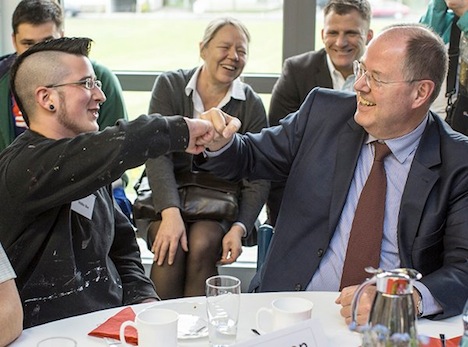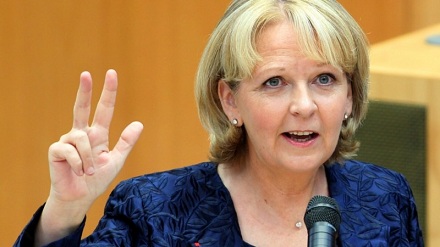Peer Steinbrück is not going to be Germany’s next chancellor.![]()
Steinbrück’s standing in opinion polls has worsened since it became clear he would become the chancellor candidate of the center-left Sozialdemokratische Partei Deutschlands (SPD, the Social Democratic Party) — the more that Germans get to know Steinbrück (pictured above), the more they dislike him, no matter how many Bavarian mountains he climbs between now and September 22.
It doesn’t necessarily mean that chancellor Angela Merkel is assured of reelection, because while her own Christlich Demokratische Union (Christian Democratic Union), together with the Bavarian Christlich-Soziale Union in Bayern (CSU, the Christian Social Union), leads the SPD in polls, it’s uncertain whether its smaller coalition partner, the Freie Demokratische Partei (FDP, Free Democrats), will win enough support to meet the 5% threshold to win seats in the Bundestag, the German parliament, though the FDP has ticked ever so slightly upwards in polls in the past couple of months.
Polls have been consistently remarkable since before 2013 began, and they make for grim reading if you’re an SPD supporter. Here’s the state of things with about six weeks to go until voting:
That wouldn’t just mean a loss, it would mean a Bob Dole-style loss — think back to the 1996 presidential election when Democratic incumbent Bill Clinton, who seemed so vulnerable after the 1994 midterm elections brought a Republican sweep of Congress, sailed to reelection against Dole. Clinton aides disparagingly joked after the fact that it was like virtually running for reelection unopposed. Dole won just 40.7% of the popular vote to 49.2% for Clinton — a landslide the likes of which hasn’t been seen in the United States since.
To put into perspective the kind of loss that Steinbrück and the SPD is facing, it’s important to remember what happened in the previous 2009 election, which at the time was the SPD’s worst postwar election result. Under Frank-Walter Steinmeier, who had served as foreign minister and deputy chancellor in the Merkel-led ‘grand coalition,’ the SPD won just 146 seats in the Bundestag (a drop of 76 seats) with just 23% of the party vote and 28% of the constituency vote. (Half of the 598 Bundestag seats are determined in first-past-the-post single-member constituencies, the other half are determined on the basis of proportional representation on the basis of statewide party lists).
But if Steinmeier’s 2009 performance was a tragedy, Steinbrück’s 2013 performance is turning out to be a farce. It’s amazing to believe that Steinbrück is in danger of leading the SPD to an even poorer result that Steinmeier’s in 2009, especially with the Greens set to improve on their 2009 performance. Continue reading How Peer Steinbrück became the Bob Dole of German politics




